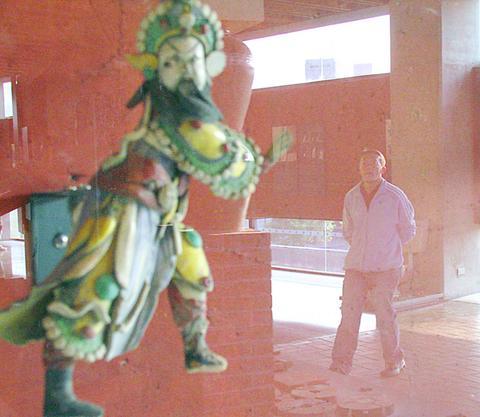Nothing bridges nature and culture more than pottery. That's the idea that the Yingge Ceramics Museum was built on and its permanent exhibits alone make a compelling case for it. Clay was the first thing humans built with and it remains the foundation of the civilized world; from dinner plates to dentures and from engine cylinders to silicon chips.
Now the past two centuries of Taiwan's ceramics history can be seen at the museum in a special exhibition -- 200 Years in Yingge starts today and runs through Saturday, Oct. 30.

PHOTO: DAVID MOMPHARD, TAIPEI TIMES
The cause for the celebration is the arrival in Yingge 200 years ago of Wu An (吳鞍), the first potter from Guangzhou to settle in the area and take up his trade. He was later joined by a brick maker named Chen Kun (陳昆) and the two helped make the area into the center of Taiwan's ceramics industry. Today, Yingge is known as much for the commodes and cable insulators it supplies to the world as for the works of art its craftsmen create.
While a bicentennial is cause to celebrate, there's reason enough to travel to the Taipei County township without it. The Yingge Ceramics Museum is world-class -- not a term usually associated with Taiwan's countless museums -- and the town it sits in has quite literally formed a unique identity for itself over the centuries.
Beginning at the museum, you can learn about the start of Taiwan's ceramics industry, when sampans on the Dahan River floated cups and bowls downstream, and about the prosperous days that came with the railroad. Then you can exit the museum and sift through stacks of plates seven decades deep. You'll be surprised at what you find (locally manufactured Japanese-era rice bowls, for example) and surprised at the cost (NT$100 per piece).
Yingge's history has been captured not only in clay, but through the camera, as well, and the 200-year exhibit's must-see section is Memories of Trains, housed in the town's old train station, next door to the new train station.
Taking the idea that clay bridges nature and civilization a step further, the museum will offer several special activities over the next two weeks as a part of the 200-year anniversary exhibit. A one-day environmental tour of the township will take visitors on a tour of the local incinerator and to a DIY recycling shop. There are also tours of the hundreds of both modern and traditional kilns in the area. Both tours are available weekends only.
The Yingge Ceramics Museum is located at 200 Wenhua Rd, Yinge Township, Taipei County (北縣鶯歌鎮文化路200號). To get there, take the train to the Yingge Railway Station and follow the big green and white signs to the museum and special exhibit centers. The exhibits are open until 5pm on weekdays and until 6pm on weekends. Admission is NT$200. More information about the exhibitions can be viewed on the Web at www.ceramics.tpc.gov.tw.

On April 26, The Lancet published a letter from two doctors at Taichung-based China Medical University Hospital (CMUH) warning that “Taiwan’s Health Care System is on the Brink of Collapse.” The authors said that “Years of policy inaction and mismanagement of resources have led to the National Health Insurance system operating under unsustainable conditions.” The pushback was immediate. Errors in the paper were quickly identified and publicized, to discredit the authors (the hospital apologized). CNA reported that CMUH said the letter described Taiwan in 2021 as having 62 nurses per 10,000 people, when the correct number was 78 nurses per 10,000

As we live longer, our risk of cognitive impairment is increasing. How can we delay the onset of symptoms? Do we have to give up every indulgence or can small changes make a difference? We asked neurologists for tips on how to keep our brains healthy for life. TAKE CARE OF YOUR HEALTH “All of the sensible things that apply to bodily health apply to brain health,” says Suzanne O’Sullivan, a consultant in neurology at the National Hospital for Neurology and Neurosurgery in London, and the author of The Age of Diagnosis. “When you’re 20, you can get away with absolute

May 5 to May 11 What started out as friction between Taiwanese students at Taichung First High School and a Japanese head cook escalated dramatically over the first two weeks of May 1927. It began on April 30 when the cook’s wife knew that lotus starch used in that night’s dinner had rat feces in it, but failed to inform staff until the meal was already prepared. The students believed that her silence was intentional, and filed a complaint. The school’s Japanese administrators sided with the cook’s family, dismissing the students as troublemakers and clamping down on their freedoms — with

As Donald Trump’s executive order in March led to the shuttering of Voice of America (VOA) — the global broadcaster whose roots date back to the fight against Nazi propaganda — he quickly attracted support from figures not used to aligning themselves with any US administration. Trump had ordered the US Agency for Global Media, the federal agency that funds VOA and other groups promoting independent journalism overseas, to be “eliminated to the maximum extent consistent with applicable law.” The decision suddenly halted programming in 49 languages to more than 425 million people. In Moscow, Margarita Simonyan, the hardline editor-in-chief of the